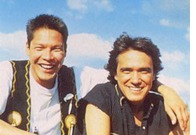| View this email online if it doesn't display correctly |
|
Come Walk in My Moccasins Newsletter
March 2016
|
|
|
|
In this issue:
Children's Books: My Heart Fills with Happiness, Raven and the Loon, Adventures of Rabbit and Bear Paw: Vol 2
Change Maker: Callie Hill
Traditional Arts: Raw Hide Drum Making
Musician: Kashtin
Teaching: The Water and The Fish
Indigenous Fusion Recipe: Fish and Chips
|
|
|
Did you know...?
There are 617 First Nations across Canada according to Indigenous & Northern Affairs Canada as of March 2014.
|
|
|
My Heart Fills With Happiness
For infants and toddlers
The sun on your face. The smell of warm bannock baking in the oven. Holding the hand of someone you love. What fills your heart with happiness? This beautiful board book, with illustrations from celebrated artist Julie Flett, serves as a reminder for little ones and adults alike to reflect on and cherish the moments in life that bring us joy.
International speaker and award-winning author Monique Gray Smith wrote My Heart Fills with Happiness to support the wellness of Indigenous children and families, and to encourage young children to reflect on what makes them happy.
|
|
|
Raven and the Loon
For preschoolers
In the time before animals were as they are today, Raven and Loon were both white. Their feathers had no colour at all. Raven spent his days swooping through the sky trying to fight off his incessant boredom, while loon spent her days in her iglu working away on her sewing. One day, too bored to even fly, Raven visited Loon and suggested a sewing game that would give their feathers some much-needed colour. The results—not at all what the two birds expected—led to Raven and Loon acquiring their now-familiar coats.
|
|
|
The Adventures of Rabbit and Bear Paws: Vol 2 The Voyageurs
For school-age children
Based on the Grandfather Aakdehewin (Bravery)
Our two comical heroes are up to their games again in this new adventure. Rabbit and Bear Paws join the Voyageurs to take the Furs from Lake of the Woods to Montreal and experience all the trials and tribulations of the Voyageur life.
|
|
|
Callie Hill
Konwanonhsiyohstha Callie Hill is Director of Tsi Tyonnheht Onkwawenna Language and Culture Centre Kenhteke. In this video Callie tells us about the centre and how it is helping to strengthen the Mohawk language and culture in Tyendinaga. (4 1/2 minutes)
|
|
|
|
|
 |
Kashtin
Kashtin, a Canadian folk rock duo in the 1980s and 1990s, was one of the most commercially successful and famous musical groups in First Nations history.
The band was formed in 1984 by Claude McKenzie and Florent Vollant, two Innu from the Maliotenam reserve on the Saint Lawrence River in Quebec. The name Kashtin means "tornado" in the Innu-aimun language, but was also chosen as a pun on the English language phrase "cashed in", in response to friends who alleged that the band was selling out.
The duo gained instant popularity in Quebec, and were featured in a documentary on the Innu for a Quebec television station early in their career. Their debut album in 1989 was recorded in their native Innu-aimun language (spoken by just 12,000 people in the world) and became a major hit in Quebec, Greenland and English Canada.
The duo were the first native singers of the country to have become known outside Canada, touring Europe (France, Germany, Belgium, Switzerland), Asia (Japan, Korea) and South America.
Kashtin produced three albums before McKenzie and Vollant began recording as solo artists.
View this Kashtin music video, filmed in Quebec.
|
|
Ohén:ton Karihwatéhkwen Teachings
|
|
The Water and the Fish
In the Ohén:ton Karihwatéhkwen, the “words before all else” or the “thanksgiving address”, the water and fish are acknowledged with gratitude. We give thanks to the water and all of the water beings, including the fish because they continue to support life on earth, and fulfill their duties, as per their original instructions. The water not only provides home to the water beings, it provides nourishment when the people, animals and other beings become thirsty; it helps to sustain us all, as our bodies at birth are made of 78% water. The water cleans our system, as well as cleaning the earth. We give thanks to all of the rivers, lakes, streams, oceans as well as the rain that falls from the sky to assist in the cleansing of our planet.
We take a moment to give thanks to all of the water beings as well, as they assist in cleaning the water; they feed and nourish the people as well as other animal and bird life. They, too, are fulfilling their original instructions given to them by the Creator.
|
|
|
|
|
Tsi Tyónnheht Onkwawén:na provides Mohawk language and culture programming at the Tyendinaga Mohawk Territory (the Mohawks of the Bay of Quinte).
Programs include: Totáhne (At Grandma's House) for preschool children, Kawenna'ón:we Primary Immersion (K-4) and Shatiwennakará:tats, a year long program for Adults
|
|
|
|
|
|
|
|
Fish and Chips
Fish, especially fish that has been caught in traditional ways, has been a food staple for many indigenous nations who live near fresh or salt water. Angela Litchfield shares her family's favourite recipe for fish and chips. |
|
|
|
|
Sources for Aboriginal books:
- Good Reads Baby Books: Written in Navajo and English, this baby book series is perfect for pre-K through 1st grade.
Aboriginal Book Lending:
|
|
| Aboriginal Family Literacy Circle Partners:
|
| | | |
Copyright 2014 Aboriginal Family Literacy Circle
1178 County Road #8, K7R 3K7, Napanee, Canada | |
|